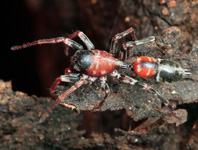Abstract
The tropical and subtropical caddisfly genus Plethus Hagen (Hydroptilidae) is recorded from Japan for the first time. The species, Plethus ukalegon Malicky and Chantaramongkol 2007, originally described from Taiwan, is redescribed based on material from Iriomote-jima and Ishigaki-jima, southern Ryukyu Islands, the southernmost region of Japan. Female and immature stages are newly described and compared with Indonesian congeners. The early instar larva was associated with the adult through mitochondrial DNA sequence comparisons, and is described in the genus Plethus for the first time. Larvae live in fast-flowing waters such as hygropetric zones, rapid streams, and waterfalls. Final instar larvae make flattened cases of silk that they attach tightly on smooth rock surfaces.
References
Felsenstein, J. (1981) Evolutionary trees from DNA sequences: A maximum likelihood approach. Journal of Molecular Evolution, 17, 368–376.
http://dx.doi.org/10.1007/BF01734359Folmer, O., Black, M., Hoeh, W., Lutz, R. & Vrijenhoek, R. (1994) DNA primers for amplification of mitochondrial cytochrome c oxidase subunit I from diverse metazoan invertebrates. Molecular Marine Biology and Biotechnology, 3, 294–299.
Hagen, H.A. (1887) Über Plethus cursitans. Verhandlungen der Zoologisch-Botanischen Gesellschaft in Wien, 37, 643–646, pl. 8. [in German]
Ito, T. (2013) The genus Orthotrichia Eaton (Trichoptera, Hydroptilidae) in Japan. In: Tojo, K., Tanida, K. & Nozaki, T. (Eds.), Biology of Inland Waters-Proceedings of the 1st Symposium on Benthological Society of Asia (BSA). Scientific Research Society of Inland Water Biology, Osaka, pp. 39–47.
Ito, T. (2015) The genus Hydroptila Dalman (Trichoptera, Hydroptilidae) in the Ryukyu Islands, southwestern Japan. Entomological Research Bulletin, 31, 7–17.
Ito, T. (2016) A catalogue of Japanese Trichoptera 3. Family Hydroptilidae Stephens. Available from: http://tobikera.eco.coocan.jp/catalog/hydroptilidae.html (accessed 22 April 2016)
Ito, T. & Ohkawa, A. (2012) The genus Ugandatrichia Mosely (Trichoptera, Hydroptilidae) in Japan. Zootaxa, 3394, 48–58.
Ito, T., Ohkawa, A. & Hattori, T. (2011) The genus Hydroptila Dalman (Trichoptera, Hydroptilidae) in Japan. Zootaxa, 2801, 1–26.
Kumar, S., Stecher, G. & Tamura, K. (2016) MEGA7: Molecular evolutionary genetics analysis version 7.0 for bigger datasets. Molecular Biology and Evolution, 28, 2731–2739.
http://dx.doi.org/10.1093/molbev/msw054Malicky, H. (1999) The net-spinning larvae of the giant microcaddisfly, Ugandatrichia spp. (Trichoptera, Hydroptilidae). In: Malicky, H. & Chantaramongkol, P. (Eds.), Proceedings of the 9th International Symposium on Trichoptera. Chiang Mai University, Chiang Mai, pp. 199–204.
Malicky, H. (2010) Atlas of Southeast Asian Trichoptera. Faculty of Science Printing Unit, Chiang Mai University, Chiang Mai, 364 pp.
Malicky, H. & Chantaramongkol, P. (2007) Beiträge zur Kenntnis asiatischer Hydroptilidae (Trichoptera). Linzer Biologische Beiträge, 39, 1009–1099. [in German]
Marshall, J.E. (1979) A review of the genera of the Hydroptilidae (Trichoptera). Bulletin of the British Museum (Natural History), Entomological Series, 39, 135–239.
Milne, M.J. (1938) Case-building in Trichoptera as an inherited response to oxygen deficiency. The Canadian Entomologist, 70, 177–180.
http://dx.doi.org/10.4039/Ent70177-9Morse, J.C. (Ed.) (2016) Trichoptera World Checklist. Available from http://entweb.clemson.edu/database/trichopt/index.htm (accessed 14 April 2016)
Rambaut, A. (2009) FigTree, Version 1.3.1. Available from http://tree.bio.ed.ac.uk/software/figtree/ (accessed 21 April 2016)
Rambaut, A. & Drummond, A.J. (2007) Tracer, Version 1.5. MCMC Trace Analysis Tool. Available from: http://tree.bio.ed.ac.uk/software/tracer/ (accessed 21 April 2016)
Ronquist, F., Teslenko, M., van der Mark, P., Ayres, D.L., Darling, A., Hohna, S., Larget, B., Liu, L., Suchard, M.A. & Huelsenbeck, J.P. (2012) MrBayes 3.2: Efficient Bayesian phylogenetic inference and model choice across a large model space. Systematic Biology, 61, 539–542.
http://dx.doi.org/10.1093/sysbio/sys029Tanabe, A.S. (2007) Kakusan: A computer program to automate the selection of a nucleotide substitution model and the configuration of a mixed model on multilocus data. Molecular Ecology Notes, 7, 962–964.
http://dx.doi.org/10.1111/j.1471-8286.2007.01807.xThompson, J.D., Higgins, D.G. & Gibson, T.J. (1994) CLUSTAL W: Improving the sensitivity of progressive multiple sequence alignment through sequence weighting, position-specific gap penalties and weight matrix choice. Nucleic Acids Research, 22, 4673–4680.
http://dx.doi.org/10.1093/nar/22.22.4673Ulmer, G. (1957) Köcherfliegen (Trichoptera) von den Sunda-Inseln (Teil III). Archiv für Hydrobiologie, Supplement, 23, 109–470. [in German]
Wells, A. (1985) Larvae and pupae of Australian Hydroptilidae (Trichoptera), with observations on general biology and relationship. Australian Journal of Zoology, Supplementary Series, 113, 1–69.
Wells, A. & Huisman, J. (1993) Malaysian and Bruneian micro-caddisflies in the tribes Stactobiini and Orthotrichiini (Trichoptera: Hydroptilidae: Hydroptilinae). Zoologische Mededelingen, 67, 91–125.
Wiggins, G.B. (1996) Larvae of the North American Caddisfly Genera (Trichoptera). Second Edition. University of Toronto Press, Toronto, 457 pp.
Wiggins, G.B. & Currie, D.C. (2008) Trichoptera families. In: Merritt, R.W., Cummins, K.W. & Berg, M.B. (Eds.), An Introduction to the Aquatic Insects of North America. Fourth Edition. Kendall/Hunt Publishing Company, Dubuque, Iowa, pp. 439–480.

